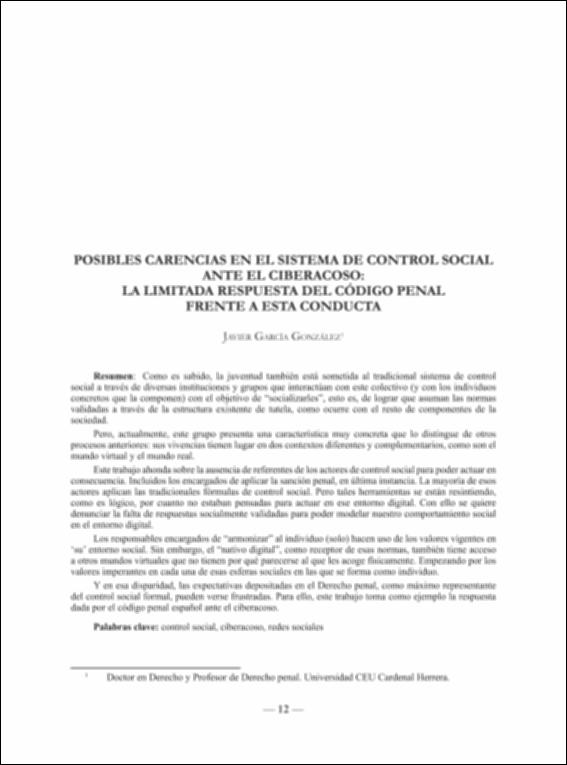Please use this identifier to cite or link to this item:
http://hdl.handle.net/10637/13031Posibles carencias en el sistema de control social ante el ciberacoso : la limitada respuesta del código penal frente a esta conducta
| Title: | Posibles carencias en el sistema de control social ante el ciberacoso : la limitada respuesta del código penal frente a esta conducta |
| Authors : | García González, Javier |
| Keywords: | Redes sociales en Internet.; Online social networks.; Social control.; Cyberbullying.; Control social.; Ciberacoso. |
| Publisher: | Dykinson |
| Citation: | García González, J. (2020). Posibles carencias en el sistema de control social ante el ciberacoso : la limitada respuesta del código penal frente a esta conducta. En García González, J., Alzina Lozano, Á. y Martín Rodríguez, G. (dir.). El derecho público y privado ante las nuevas tecnologías (pp. 12-32). Madrid : Dykinson. ISBN 978-84-1324-758-8. |
| Abstract: | Como es sabido, la juventud también está sometida al tradicional sistema de control social a través de diversas instituciones y grupos que interactúan con este colectivo (y con los individuos concretos que la componen) con el objetivo de “socializarles”, esto es, de lograr que asuman las normas validadas a través de la estructura existente de tutela, como ocurre con el resto de componentes de la sociedad. Pero, actualmente, este grupo presenta una característica muy concreta que lo distingue de otros procesos anteriores: sus vivencias tienen lugar en dos contextos diferentes y complementarios, como son el mundo virtual y el mundo real. Este trabajo ahonda sobre la ausencia de referentes de los actores de control social para poder actuar en consecuencia. Incluidos los encargados de aplicar la sanción penal, en última instancia. La mayoría de esos actores aplican las tradicionales fórmulas de control social. Pero tales herramientas se están resintiendo, como es lógico, por cuanto no estaban pensadas para actuar en ese entorno digital. Con ello se quiere denunciar la falta de respuestas socialmente validadas para poder modelar nuestro comportamiento social en el entorno digital. Los responsables encargados de “armonizar” al individuo (solo) hacen uso de los valores vigentes en ‘su’ entorno social. Sin embargo, el “nativo digital”, como receptor de esas normas, también tiene acceso a otros mundos virtuales que no tienen por qué parecerse al que les acoge físicamente. Empezando por los valores imperantes en cada una de esas esferas sociales en las que se forma como individuo. Y en esa disparidad, las expectativas depositadas en el Derecho penal, como máximo representante del control social formal, pueden verse frustradas. Para ello, este trabajo toma como ejemplo la respuesta dada por el código penal español ante el ciberacoso. / As it is well known, youth is also subject to the traditional system of social control through various institutions and groups which interact with this collective (as well as with the specific individuals who make it up) with the aim of “socializing them”, that is, in order to get them to assume the validated regulations through the existing structure of guardianship, as it happens with the rest of society’s members. But nowadays, this group presents a very specific characteristic that distinguishes it from previous processes: its experiences take place in two different and complementary contexts which are the virtual and the real world. This paper delves into the absence of referents from social control actors to be able to act in consequence. Including those charged with the enforcement of the criminal sanction, as a last resort. Most of these actors apply the usual rules of social control. But such tools are, of course, feeling the effects as they were not designed to act in that digital environment. Consequently, it is intended to denounce the lack of socially validated responses so that not only our social behavior in the digital environment can be modelled but also the actors responsible for the enforcement of the criminal sanction. Those people responsible of “harmonizing” the individual make use of the current values in ‘their’ social environment. However, the “digital native”, as the receiver of these norms, has also access to other virtual worlds which needn’t look like to the one that takes them in. Especially the prevailing values of those social sphere in which they are formed as individuals. And in this discrepancy, the expectations placed on Criminal Law, as the highest representative of formal social control, can be frustrated. Therefore, this paper takes as an example the response given by the Spanish penal code to cyberbullying. |
| Description: | Esta monografía se encuentra en la siguiente URL: https://www.dykinson.com/libros/el-derecho-publico-y-privado-ante-las-nuevas-tecnologias/9788413247588/ |
| URI: | http://hdl.handle.net/10637/13031 |
| Rights : | http://creativecommons.org/licenses/by-nc-nd/4.0/deed.es |
| ISBN: | 9788413247588 |
| Issue Date: | 1-Jan-2020 |
| Center : | Universidad Cardenal Herrera-CEU |
| Appears in Collections: | Dpto. Ciencias Jurídicas |
Items in DSpace are protected by copyright, with all rights reserved, unless otherwise indicated.


